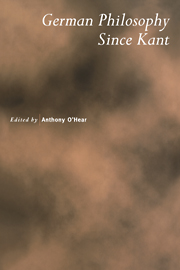Book contents
- Frontmatter
- Contents
- Preface
- Notes on Contributors
- Fichte and Schelling
- Hegel's Critique of Foundationalism in the ‘Doctrine of Essence’
- Schopenhauer's Pessimism
- Karl Marx
- Nietzsche's Virtues: A Personal Inquiry
- Bolzano, Brentano and Meinong: Three Austrian Realists
- Vorsprung durch Logik: The German Analytic Tradition
- German Philosophy of Mathematics from Gauss to Hilbert
- The Revolution of Moore and Russell: A Very British Coup?
- Husserl's Concept of Being: From Phenomenology to Metaphysics
- Frege and the Later Wittgenstein
- Otto Neurath, the Vienna Circle and the Austrian Tradition
- Does the Nothing Noth?
- Reactionary Modernism
- Adorno on Disenchantment: The Scepticism of Enlightened Reason
- Habermas, Science and Modernity
- German Philosophy Today: Between Idealism, Romanticism, and Pragmatism
- The Career of Aesthetics in German Thinking
- Hermeneutic and Analytic Philosophy. Two Complementary Versions of the Linguistic Turn?
- Index of Names
The Revolution of Moore and Russell: A Very British Coup?
Published online by Cambridge University Press: 29 September 2009
- Frontmatter
- Contents
- Preface
- Notes on Contributors
- Fichte and Schelling
- Hegel's Critique of Foundationalism in the ‘Doctrine of Essence’
- Schopenhauer's Pessimism
- Karl Marx
- Nietzsche's Virtues: A Personal Inquiry
- Bolzano, Brentano and Meinong: Three Austrian Realists
- Vorsprung durch Logik: The German Analytic Tradition
- German Philosophy of Mathematics from Gauss to Hilbert
- The Revolution of Moore and Russell: A Very British Coup?
- Husserl's Concept of Being: From Phenomenology to Metaphysics
- Frege and the Later Wittgenstein
- Otto Neurath, the Vienna Circle and the Austrian Tradition
- Does the Nothing Noth?
- Reactionary Modernism
- Adorno on Disenchantment: The Scepticism of Enlightened Reason
- Habermas, Science and Modernity
- German Philosophy Today: Between Idealism, Romanticism, and Pragmatism
- The Career of Aesthetics in German Thinking
- Hermeneutic and Analytic Philosophy. Two Complementary Versions of the Linguistic Turn?
- Index of Names
Summary
The question I shall attempt to address in what follows is an essentially historical one, namely: Why did analytic philosophy emerge first in Cambridge, in the hands of G. E. Moore and Bertrand Russell, and as a direct consequence of their revolutionary rejection of the philosophical tenets that form the basis of British Idealism? And the answer that I shall try to defend is: it didn't. That is to say, the ‘analytic’ doctrines and methods which Moore and Russell embraced in the very last years of the nineteenth century were not revolutionary, did not emerge first in Cambridge, were the creation of neither Russell nor Moore and cannot be explained by appeal to facts concerning British Idealism. The adoption of the doctrines and methods which characterised the earliest manifestations of British analytic philosophy are to be explained neither by reference to anything specifically British, nor by appeal to anything unproblematically philosophical. Or so I shall argue.
In taking this line I am, of course, intending to dissent from a very widespread and deeply entrenched view, the most detailed and authoritative defence of which forms the content of Peter Hylton's book Russell, Idealism and the Emergence of Analytic Philosophy. Because his presentation of the case is, precisely, so detailed and authoritative, I shall tend to take it as exemplary.
- Type
- Chapter
- Information
- German Philosophy since Kant , pp. 193 - 208Publisher: Cambridge University PressPrint publication year: 1999
- 11
- Cited by

